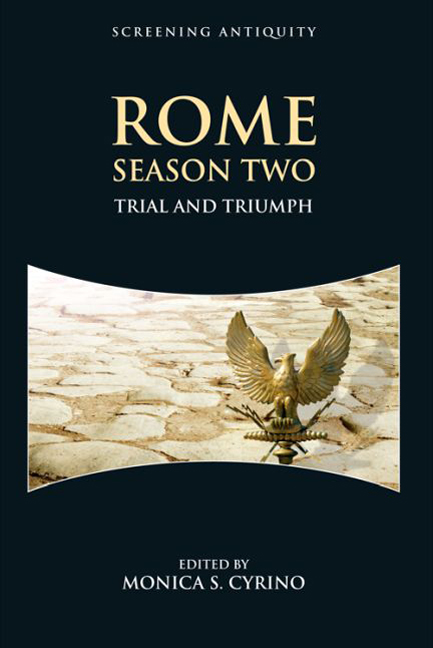Book contents
- Frontmatter
- Contents
- Series Editors’ Preface
- Editor's Acknowledgments
- Contributors
- List of Illustrations
- Episode Listing
- Cast List
- Introduction: The Trials and Triumphs of Rome, Season Two
- PART I POWER AND POLITICS
- 1 A Touch Too Cerebral: Eulogizing Caesar in Rome
- 2 Discharging Pullo and Vorenus: Veterans in Rome
- 3 Gangsterism in Rome
- 4 Class, Chaos, and Control in Rome
- 5 Earning Immortality: Cicero's Death Scene in Rome
- 6 The Triumvirate of the Ring in Rome
- 7 Jews and Judaism in Rome
- PART II Sex and Status
- Filmography
- Bibliography
- Index
3 - Gangsterism in Rome
from PART I - POWER AND POLITICS
Published online by Cambridge University Press: 07 October 2017
- Frontmatter
- Contents
- Series Editors’ Preface
- Editor's Acknowledgments
- Contributors
- List of Illustrations
- Episode Listing
- Cast List
- Introduction: The Trials and Triumphs of Rome, Season Two
- PART I POWER AND POLITICS
- 1 A Touch Too Cerebral: Eulogizing Caesar in Rome
- 2 Discharging Pullo and Vorenus: Veterans in Rome
- 3 Gangsterism in Rome
- 4 Class, Chaos, and Control in Rome
- 5 Earning Immortality: Cicero's Death Scene in Rome
- 6 The Triumvirate of the Ring in Rome
- 7 Jews and Judaism in Rome
- PART II Sex and Status
- Filmography
- Bibliography
- Index
Summary
Illegal activities and the violence that underpins them form a large part of the storyline of Rome. Up to now, however, little attention has been paid to the depiction of criminality in the series, perhaps because the sexual politics are so prominent in their own right. Still, like love and marriage, sex and violence are a natural combination for a modern audience and the second component deserves closer attention. If the sex cannot be viewed as simply gratuitous, so the violence contributes to one of the most important motifs of the series: the will to succeed and gain one's desires by whatever means might be necessary and the human cost of such behavior. As with much of Rome, the narrative presentation is modern, but draws on themes already present in the Roman world. During the breakdown of order in the late Republic and the triumviral period after the assassination of Julius Caesar, aristocratic politicians act like leaders of criminal gangs, while in the face of ineffective government the general populace is subject to local forces that maintain a tenuous order by both exploiting their fellows and preventing others from doing the same. This gangster theme is well worth exploring both for what it reveals about ancient Rome and the modern viewers’ expectations.
CALLING OUT THE BAD GUYS
The accusation of criminality and the consequent assumption that the speaker making this claim is defending the peaceful and lawful privileges of all society is deeply embedded in Roman political discourse. These are, of course, the words of the wealthy and powerful, since the plebs in general had no voice in government. Following the death of Augustus, two bronze plaques were set up at the entrance to his tomb to memorialize his services to the Roman state. Amid various, often tendentious claims in this summary of imperial services that he had arranged to be distributed throughout the Empire, the emperor declared that he had brought peace to the seas, freeing them from the ravages of “bandits.” He meant by this his defeat in the 30s bc of Sextus Pompey, whose control of the shipping lanes around Italy had threatened Octavian's power in the west. The people of Rome thus had their food supplies restored by the efforts of Octavian and his general, Agrippa.
- Type
- Chapter
- Information
- Rome Season TwoTrial and Triumph, pp. 36 - 47Publisher: Edinburgh University PressPrint publication year: 2015



